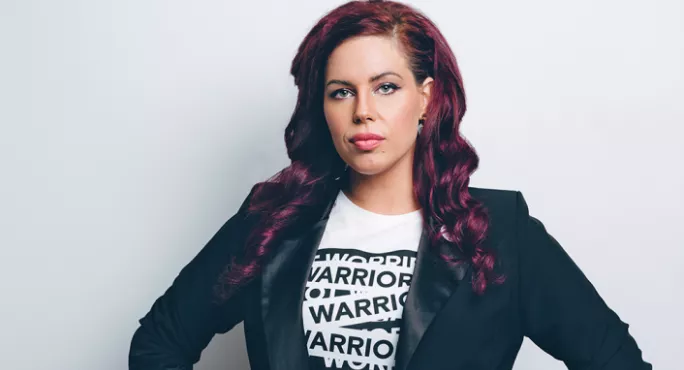- Home
- ‘Too often teachers are portrayed as saints or shirkers - there seems to be nothing in between’
‘Too often teachers are portrayed as saints or shirkers - there seems to be nothing in between’

If life has taught me anything, it’s that views which appear, upon first glance, to be polar opposites often represent points on a spectrum which exist side by side.
I first began thinking about this a few years ago when in the orbit of a white person who would talk incessantly about how she only dated men of colour. I couldn’t put my finger on what it was precisely which irritated me so much about it - after all, we all have ‘types’ and preferences - until it dawned on me that to fetishise ethnic minorities is scarcely less racist than to demonise them. She was using (predominantly) black men in the same way as I would a handbag - as a status symbol, because she thought it said something about her.
Around the same time, I was doing some work in a domestic violence refuge in Surrey. Talking to the women there, themes began to emerge around their partners oscillating between emotional, sexual and physical abuse and “putting them on a pedestal”, grand romantic gestures or “treating them like princesses”.
In his book Stiff Upper Lip, which explores historical abuse in Britain’s boarding schools, Alex Renton talks about English society’s paradoxical relationship with children. On the one hand, he argues, we think of them as needing to be wrapped up in cotton wool, on the other we subject them to traumas and stresses way beyond their coping skills or comprehension. I was reminded of this during the furore over my comments on gender-neutral language last November, when on the receiving end of the phrase “let kids be kids” hundreds of times. Letting “kids be kids”, in the mind of your average social media user, it appears, precludes asking them to consider anything about same-sex couples or people of different genders, but it doesn’t mean shielding them from a culture which aggressively conspires to force them to conform to narrow and often damaging parameters of gender expression from the moment they are born. Bizarre.
Sexualising certain races and racism, idolising women and misogyny, overprotecting children and neglecting them, whilst seeming polarised, in fact often come from the same ideological place.
We can see this type of thinking in the media’s portrayal of people who work in the public sector. On the one hand, police officers, firefighters, ambulance staff, nurses and doctors are hailed as heroes, honoured at the Pride of Britain and other award ceremonies and, as was seen in the now 25-year-old case of Stephen Lawrence’s murder, sometimes wrongly placed beyond consequence and rebuke. On the other, people who work in these notoriously underfunded and understaffed industries and daily save the lives of the public are often painted as overpaid, lazy and work-shy - usually when yet another cut to the sector needs to be justified. One only needs to look at the recent news story of Sgt Leanne Carr, who had the temerity to go on holiday whilst signed off work for stress (”all funded by the public purse” - Daily Star), to see evidence of this.
Lack of respect for teachers
The neglected stories are those in between the exceptions and, in turn, the public are invited to take a “side” on how they view these professions as a whole.
I’m sure you can see where I am going with this. Last week, at a panel discussion on teacher stress hosted by Tes, I was asked what would entice me to become a teacher. My answer was: if teachers were given the respect they deserve. Rightly, discussions on teacher recruitment and retention have taken pay and workload into account, but the lack of value placed upon, and respect given to, the profession is, I think, perhaps playing a part, too.
This isn’t just confined to the media. Lucy Rycroft-Smith was also on the panel and spoke about how disruptive behaviour, violence and abuse from pupils contributed to her giving up teaching. Yet I can’t help but feel that the endless parade of stories about maverick parents marching up to school gates to challenge teachers’ authority on uniform rules or phone use, or the way the very rare instances of teachers who groom their pupils are constantly rehashed, recycled and revisited in the media aren’t helping.
On the other hand, it’s easy to romanticise teachers. I know I am occasionally guilty of this. I remain vocally grateful for my education and those who gifted it to me. Since the Tes debate, I have begun to ponder whether I do an accidental disservice to teachers in the process.
Of course, I am not a teacher and therefore can’t go definitive on this. Yet I wonder whether if the public portrayal of teachers was more realistic - if it was widely understood that teaching by its nature attracts people who are caring and want to make a difference, who are currently working ridiculously long hours and undertaking responsibilities way beyond their remit, but are ultimately flawed and imperfect just like the rest of us - it might help to bolster a floundering sector.
Natasha Devon MBE is the former government mental health champion. She is a writer and campaigner and visits an average of three schools per week all over the UK. She tweets @_natashadevon. Find out more about her work here
Keep reading for just £1 per month
You've reached your limit of free articles this month. Subscribe for £1 per month for three months and get:
- Unlimited access to all Tes magazine content
- Exclusive subscriber-only stories
- Award-winning email newsletters


